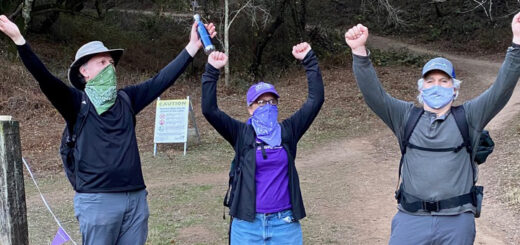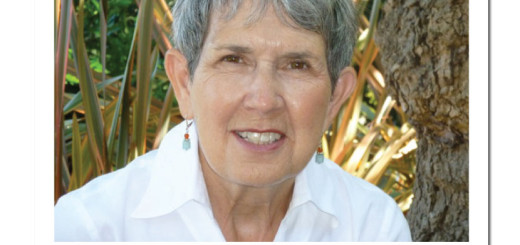Demonstrating her passion for advocacy worldwide
If you are traveling with Elizabeth Santos of Ukiah, odds are high that she will ask you to take a picture of her holding her purple #ENDALZ sign. This Alzheimer’s Association volunteer carries her sign””and her passion for advocacy””everywhere she goes.
Seeking support for others
Elizabeth has owned three small long-term care facilities in Mendocino County for over 20 years. When she entered this field, she didn’t know that her work would become her lifelong passion.
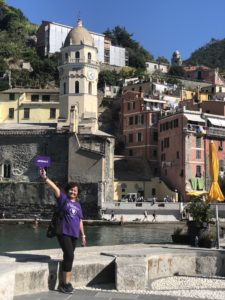
Through her work, Elizabeth has encountered many families who did not know how to care for their loved ones living with Alzheimer’s or other dementias. Sometimes the families were not able to afford professional care.
When Elizabeth began to search for resources to help these families, she discovered how challenging it was to find help in a rural town like Ukiah. It has become her mission to help families overcome these challenges.
Becoming a volunteer
Initially, Elizabeth joined local coalitions and reached out to organizations like hospice, the Department of Public Health, and even the National Institutes of Health. She also connected with the Alzheimer’s Association office in Sonoma County.
As she learned more about the services the Alzheimer’s Association had to offer, such as the 24/7 helpline, Elizabeth shared this information with members of her community. She enrolled in continuing education classes, started networking with others and became an advocate.
The Alzheimer’s Association has become Elizabeth’s go-to resource. “They’re my other family,” she shared. “They have guided me and trained me so well.”
What am I getting into?
Elizabeth originally came to the U.S. from the Philippines in 1986 with a background in medical technology. She hated studying politics when she was in school.
About three years ago, Shelley Dombroski, Regional Director of the North Bay offices, invited Elizabeth to attend California Advocacy Day in Sacramento. Even though she had never been interested in politics, Elizabeth said yes.
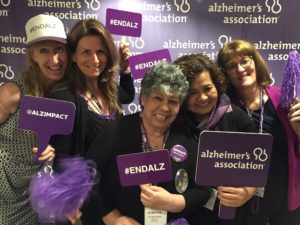
At Advocacy Day Elizabeth met people from all over California whose lives had been impacted by Alzheimer’s. While Elizabeth’s grandmother had died from Alzheimer’s in the Philippines, she didn’t have any loved ones with Alzheimer’s in the U.S.
At first, Elizabeth wasn’t sure what she could contribute. Then she realized that by participating, she was representing all from Mendocino County who are living with Alzheimer’s or are caregivers.
Some of the most important aspects of Alzheimer’s care are early detection and accurate diagnosis. Elizabeth shared how this one of the biggest challenges in rural communities, where specialists such as neurologists are lacking.
In reflecting on her Advocacy Day experience, Elizabeth said, “it just touched my heart.”
Part of a team
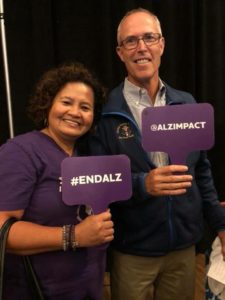
After Advocacy Day, Elizabeth joined the volunteer advocacy team for Congressman Jared Huffman. In her new role, Elizabeth has sought support from her team members, friends, and Alzheimer’s Association staff to learn more about government and advocacy.
Elizabeth’s new experiences as an advocacy volunteer include attending town hall meetings and speaking with her state and federal legislators. She learned how to use Twitter as part of her volunteer advocate role, helping her communicate with legislators, other volunteers and other community members.
What it means to be an advocate
Elizabeth shared how much she appreciates the support she receives from Alzheimer’s Association. The chapter and state policy staff answer her questions and provide training, data and sample communication resources. “I feel like I have several moms who are looking out for me,” shared Elizabeth. “It’s amazing!”
Traveling to Washington, D.C.
Based on her positive experience in Sacramento that the next year, Elizabeth registered for the Advocacy Forum in Washington, D.C. After receiving training and planning their visits, teams of advocates took buses to Capitol Hill. “As I rode the bus to the Capitol,” said Elizabeth, “it really hit me that I was doing something that could help a lot of people.”
Elizabeth and her fellow team members met with legislators and their staff. They encouraged legislators to support increased federal Alzheimer’s research funding, along with bills related to palliative care training and a public health approach to Alzheimer’s.
Making an impact
Elizabeth was thrilled when the BOLD Alzheimer’s Act was signed into law in December. She felt happy, proud and grateful to have been a part of that effort.
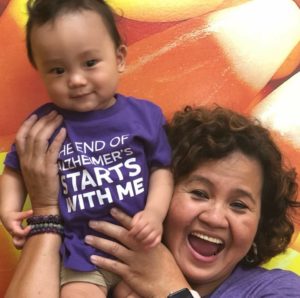
When the BOLD Act passed, she sent thank you notes to her legislators and other key champions in Congress, using Alzheimer’s stamps. She shared that implementation of the law would be a great gift for millions of families.
Motivated by others’ stories
Elizabeth is inspired by the other volunteers, especially younger women on her team who have been caring for parents with Alzheimer’s, as well as advocates who are living with the disease. When she is having a hard day, she thinks of these individuals.
There are times, after having met with a family who is facing a tough situation, that Elizabeth feels like giving up. “I’ll come home and tell my husband I’ve had enough of dementia,” she admits. “But then I’ll attend an advocacy retreat, meet with my team or read a kind Tweet and I’m re-energized.”
Spreading the #ENDALZ message worldwide
When Elizabeth went to the Advocacy Forum, she received a purple #ENDALZ sign. In many of her photos from meetings with legislators, she asks them to hold the sign. “I always have the sign in my car,” Elizabeth said.
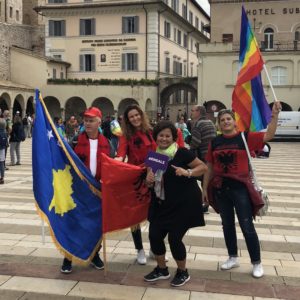
Last fall, Elizabeth and her husband, Jay, went on a backpacking trip in Italy. While excited about the trip, she was sad to be missing the Petaluma Walk to End Alzheimer’s for the first time in over 10 years. Elizabeth packed the #ENDALZ sign in her luggage and took photos with it throughout her vacation.
Recruiting other advocates
Elizabeth feels that it’s important for people from diverse backgrounds and communities to get involved with advocacy. “Alzheimer’s disease is a global crisis,” said Elizabeth. “It’s not a problem for just one country or racial/ethnic group. Everyone is affected.”
Elizabeth’s passion for advocacy is infectious. A few years ago, she connected through social media with a caregiver in Chico whose husband had Alzheimer’s. Elizabeth encouraged her to reach out to the Alzheimer’s Association in Chico and shared other resources over time.
The caregiver often saw Elizabeth’s posts about being an advocate and thanked her for her efforts. The woman’s husband passed away few years ago.
In January, Elizabeth received a message that the caregiver was attending Advocacy Day in Sacramento. She shared that Elizabeth had inspired her to become involved. After five years of communicating on social media, they finally met in person.
Elizabeth shares what you need to become an advocate
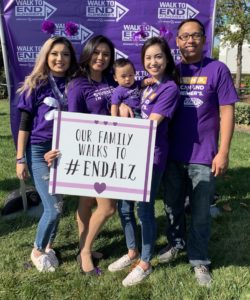
Elizabeth’s passion for advocacy has inspired her own family as well. Even though she couldn’t attend the Petaluma Walk to End Alzheimer’s last year, she was proud that her three daughters and their families all participated. Her grandson Sammy, not even one year old at the time, was there as a young advocate.
Her hopes for the future
Elizabeth aspires to be the voice for those who cannot speak for themselves. She has found her true passion through advocacy.
“We can’t change the end of the journey yet,” acknowledged Elizabeth. “I hope that someday there will be a cure. Until then, I hope my advocacy will lead to more programs in our communities to ease the journey for those who are facing Alzheimer’s.”
Elizabeth embraces the Alzheimer’s Association vision of a world without Alzheimer’s disease. She remains optimistic, stating that, “One day I’ll take a picture without my #ENDALZ sign.”
Elizabeth, on her experience at the Advocacy Forum





